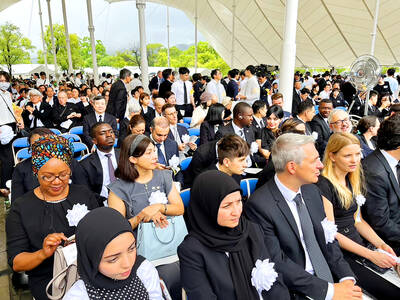Bucking the general trend of the global financial crisis, Argentina is set to reach a historic trade surplus this year of about US$18 billion, a government official said on Sunday.
“In the middle of the general crisis, Argentina has a trade balance surplus,” Argentine Deputy Secretary of Regional Integration Eduardo Sigal told El Mundo radio.
Sigal expressed doubt at the private sector’s estimates of US$15 billion.
“My estimates say that we will end up with a surplus of between US$17 billion and US$18 billion,” he said.
The official said Argentina recorded a low trade volume of US$100 million in 2002, which soared to US$1.45 billion last year.
Agreements signed last week between Argentine President Cristina Kirchner and Venezuelan President Hugo Chavez would add another US$1.1 billion to trade volume this year, Sigal said.
Trade with Venezuela, he added, would increase not only for food products but also in the auto sector, with Caracas set to purchase up to 10,000 vehicles from Argentina and for agricultural machinery and milk-processing tanks.
The auto import deal came after Chavez made good on a threat to scuttle an agreement previously granted to Colombia in favor of other trade partners, after Bogota charged that Venezuela was supplying weapons to the Revolutionary Armed Forces of Colombia, a leftist guerrilla group.
Meanwhile, Argentine Foreign Minister Jorge Taiana was to begin a trade visit to Mexico yesterday accompanied by private entrepreneurs.

DEFENSE: The first set of three NASAMS that were previously purchased is expected to be delivered by the end of this year and deployed near the capital, sources said Taiwan plans to procure 28 more sets of M-142 High Mobility Artillery Rocket Systems (HIMARS), as well as nine additional sets of National Advanced Surface-to-Air Missile Systems (NASAMS), military sources said yesterday. Taiwan had previously purchased 29 HIMARS launchers from the US and received the first 11 last year. Once the planned purchases are completed and delivered, Taiwan would have 57 sets of HIMARS. The army has also increased the number of MGM-140 Army Tactical Missile Systems (ATACMS) purchased from 64 to 84, the sources added. Each HIMARS launch pod can carry six Guided Multiple Launch Rocket Systems, capable of

TRAJECTORY: The severe tropical storm is predicted to be closest to Taiwan on Wednesday and Thursday, and would influence the nation to varying degrees, a forecaster said The Central Weather Administration (CWA) yesterday said it would likely issue a sea warning for Tropical Storm Podul tomorrow morning and a land warning that evening at the earliest. CWA forecaster Lin Ting-yi (林定宜) said the severe tropical storm is predicted to be closest to Taiwan on Wednesday and Thursday. As of 2pm yesterday, the storm was moving west at 21kph and packing sustained winds of 108kph and gusts of up to 136.8kph, the CWA said. Lin said that the tropical storm was about 1,710km east of Oluanpi (鵝鑾鼻), Taiwan’s southernmost tip, with two possible trajectories over the next one

Tropical Storm Podul strengthened into a typhoon at 8pm yesterday, the Central Weather Administration (CWA) said, with a sea warning to be issued late last night or early this morning. As of 8pm, the typhoon was 1,020km east of Oluanpi (鵝鑾鼻), Taiwan’s southernmost tip, moving west at 23kph. The storm carried maximum sustained winds of 119kph and gusts reaching 155kph, the CWA said. Based on the tropical storm’s trajectory, a land warning could be issued any time from midday today, it added. CWA forecaster Chang Chun-yao (張竣堯) said Podul is a fast-moving storm that is forecast to bring its heaviest rainfall and strongest

CRITICISM: It is deeply regrettable that China, which is pursuing nuclear weapons, has suppressed Taiwan, which is pursuing peace, a government official said Representative to Japan Lee Yi-yang (李逸洋) yesterday accused Beijing of interference after Taiwan’s official delegation to the Nagasaki Peace Memorial Ceremony in Japan was assigned seating in the “international non-governmental organizations [NGO]” area. “Taiwan is by no means an international NGO, but a sovereign nation that is active on the international stage,” Lee said. Lee and Chen Ming-chun (陳銘俊), head of the Taipei Economic and Cultural Office (TECO) in Fukuoka, attended the ceremony in Nagasaki yesterday, which marked the 80th anniversary of the atomic bombing of the city. That followed Lee’s attendance at the Hiroshima Peace Memorial Ceremony on Wednesday